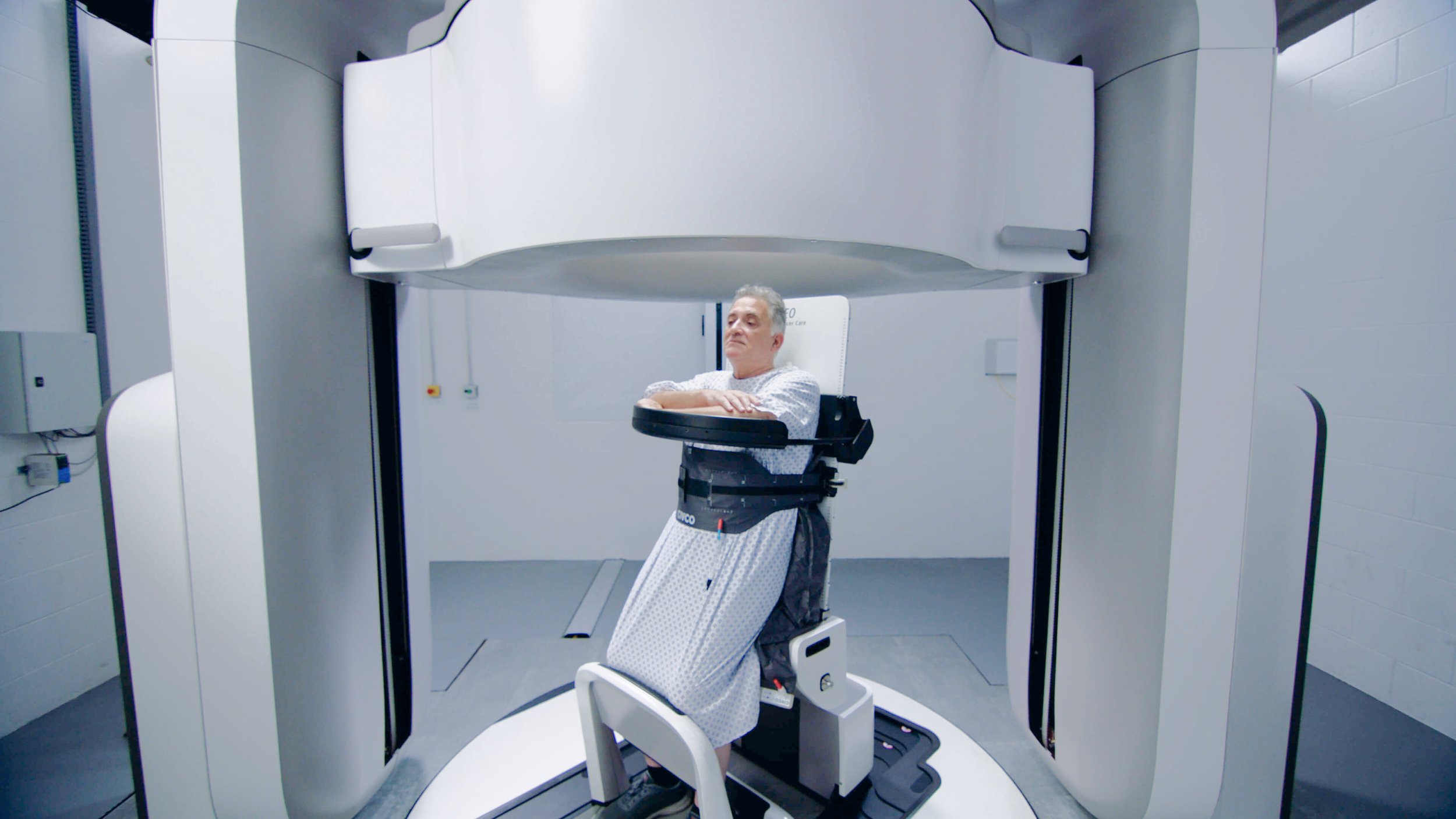Macmillan Cancer Support champions innovation with strategic investment in Leo Cancer Care to advance revolutionary upright radiotherapy solutions
Macmillan Cancer Support, the UK’s leading cancer care charity, is proud to announce a strategic impact investment in Leo Cancer Care, an innovative leader in the field of oncology.
With a visionary approach, Leo Cancer Care is dedicated to transforming cancer care treatment through its pioneering upright radiotherapy technology. This investment will support Leo Cancer Care’s mission to improve patient outcomes by making cancer treatments more precise, more comfortable, and more accessible.
This technology aims to enhance clinical effectiveness and patient experience, as well as reduce the radiation of healthy tissue, with the subsequent reduction of life-long side effects. It also has the ambition of saving the NHS time and money. Previous research suggests that up to one in four people will need radiotherapy for cancer in their lifetime[i], and current standard procedures can cause anxiety or discomfort for some patients[ii].
Upright Radiotherapy
Currently, those receiving radiotherapy lie down while a gantry rotates a radiation source around them to direct radiotherapy onto the affected part of the body. The idea behind Leo's innovation is simple: move the patient, not the radiotherapy source.
Marie, Leo Cancer Care's first product to be developed, named after the Nobel prize-winning physicist Marie Curie, delivers therapy to patients while supported in an upright position by keeping the radiation beam fixed and slowly rotating the patient as treatment is administered.
The technology is currently focused on delivering technology for particle beam therapy, with future products developed for standard X-ray therapy too.
With the patient treated upright, as opposed to lying down throughout treatment, there is less pressure on internal organs, and they may be in a better anatomical position for treatment[i]. There is also evidence to suggest that breathing drives less movement in an upright position, which could help reduce damage to healthy tissue and minimise side effects[ii].
Stephen Towe, Leo Cancer Care’s CEO, said: “It is a dream come true for us at Leo Cancer Care to be partnering with Macmillan Cancer Support as we work to deliver a more comfortable way for people living with cancer to receive treatment in the future.”
Towe also acknowledged that the Macmillan investment is important to him on a personal level after his father died from cancer when he was younger.
“My Dad is the reason for me working in radiation oncology,” he explained. “He had tremendous support from Macmillan, so it is special for me to have them come in and support the business in this way because I have seen first-hand the impact Macmillan has.”
Professor Richard Simcock, Chief Medical Officer at Macmillan, said: “We’re very pleased to be working with Leo Cancer Care as the company takes bold steps to improve the treatment experiences for people with cancer. At Macmillan, we do whatever it takes to ensure people with cancer get the best support possible. We’re proud to be a part of this exciting innovation, which has the potential to significantly reduce the psychological burden of radiotherapy. Radiotherapy can feel intimidating due to lying down, not being able to see your healthcare professional and being surrounded by machinery. By moving the patient into an upright position this can create a more positive experience. It can help them feel more in control, which can reduce the anxiety they might feel lying down, and it’s reassuring for them to be able to see their healthcare professional.”
Paulette Burgess, a member of Macmillan’s Innovation Community, a group made up of people affected by cancer convened to directly influence and shape Macmillan’s innovation partnerships and services, said: “There appear to be several exciting aspects to this innovation, including the empowerment of patients, especially those who previously had a fear of traditional scanners. Being upright during the procedure and face-to-face with the medical staff could have a number of psychological benefits for patients who find scanning difficult.”
The investment in Leo Cancer Care is Macmillan Cancer Support’s third from its Innovation Impact Investment Portfolio, through which the charity plans to invest a total of £3.5 million over two years.
*Leo technology has been used in research in the United States and Europe and is currently awaiting regulatory clearance for clinical use.
[1] Macmillan Cancer Support's investment is in Centaur Health Holdings, Inc., the parent company of Leo Cancer Care Ltd.
[1] Analysis suggests one in two people will get cancer in their lifetime. (Source: Ahmad AS, Ormiston-Smith N, Sasieni PD. Trends in the lifetime risk of developing cancer in Great Britain: comparison of risk for those born from 1930 to 1960. Br J Cancer 2015; 112: 943-7. doi: 10.1038/bjc.2014.606.) Further analysis suggests around half of people who get cancer should receive radiotherapy as part of their treatment according to standard clinical guidelines. (Source: Delaney G, Jacob S, Featherstone C et al. The role of radiotherapy in cancer treatment: estimating optimal utilization from a review of evidence-based clinical guidelines. Cancer 2005; 104: 1129-37. Doi: 10.1002/cncr.21324. Erratum in: Cancer 2006;107: 660. PMID: 16080176.) Taken together, this results in the estimate that around one in four people will require radiotherapy for cancer in their lifetime.
[1] Forbes E, Baker AL, Britton B et al. Non-pharmacological approaches to procedural anxiety reduction for patients undergoing radiotherapy for cancer: systematic review protocol. BMJ Open 2020; 10: e035155. doi: 10.1136/bmjopen-2019-035155. PMID: 33039983; PMCID: PMC7549444
[1] Schreuder AN, Hsi WC, Greenhalgh J et al. Anatomical changes in the male pelvis between the supine and upright positions-A feasibility study for prostate treatments in the upright position. J Appl Clin Med Phys 2023; 24: e14099. doi: 10.1002/acm2.14099. Epub 2023 Jul 24. PMID: 37488974; PMCID: PMC10647982.
[1] Boisbouvier S, Boucaud A, Tanguy R et al. Upright patient positioning for pelvic radiotherapy treatments. Tech Innov Patient Support Radiat Oncol 2022; 24: 124-130. doi: 10.1016/j.tipsro.2022.11.003. PMID: 36471684; PMCID: PMC9719023.

